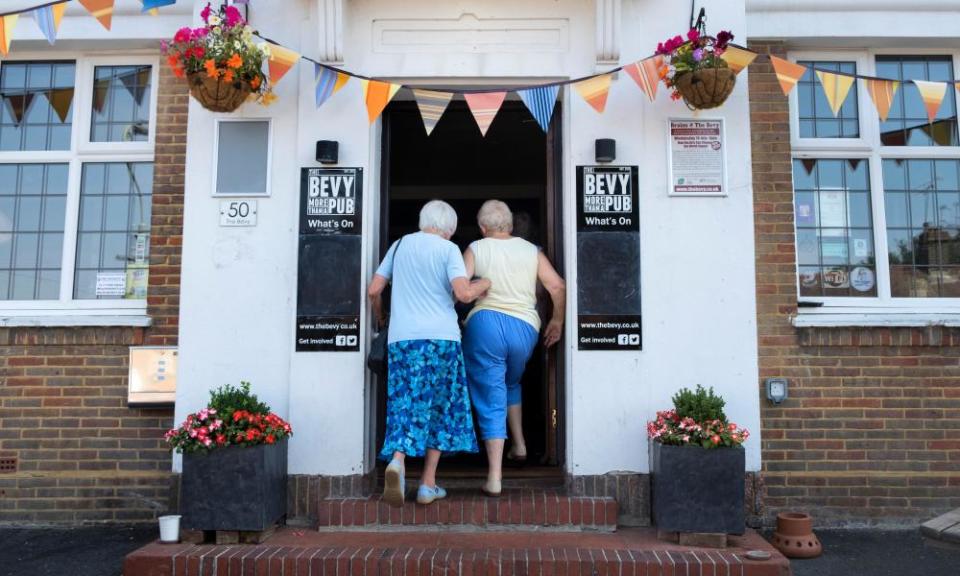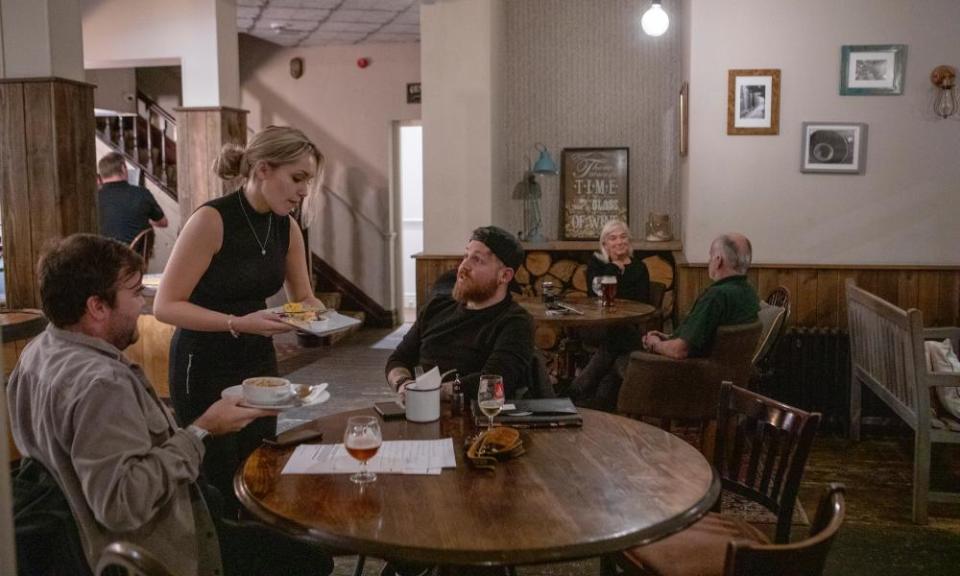A hub for the village: how locals are buying up pubs at risk of closure
A final lick of paint is drying on the donated, mismatched chairs and tables as the handful of volunteers gratefully sample the new chef’s signature dish – a chunky pork chop sandwich with apple relish.
Four years after the Blue Bell in Stoke Ferry, Norfolk, last called time, it will next month celebrate its grand reopening as a community pub, the triumphant climax of a campaign by local residents to stave off the permanent closure of the last pub in the village, which once boasted eight.
It is also one of a growing number of successful community buyouts that, according to Camra (Campaign for Real Ale), have been a major factor in helping to slow the pace of pub disappearances in the UK.
Pubs have been in decline for years, but the pandemic wreaked further havoc and, according to the British Beer and Pub Association, 2,000 permanently closed during the first year of lockdown. Many, like the Blue Bell, were in rural locations, leaving small communities without a space to meet, prompting greater isolation.
The rise of community pubs, however, has helped to buck this trend. There are now more than 70 active community ownership campaigns currently under way on top of 179 existing pubs owned or run by their communities, according to Camra.
Their community focus also means that they typically offer additional services, from full-scale post offices that maintain access to essential postal and basic banking services, to shops, cafes and meals on wheels – all supporting local suppliers and employment.
“The last few years of restrictions and closures have made us all realise just how vital our local pubs are to communities up and down the country – and how important they are to bringing people together as we recover from the pandemic,” said Camra’s chairman, Nik Antona.
“We are seeing a resurgence in pub-saving campaigns, with people coming together to save their locals from closure or demolition – or banding together to bring pubs into community ownership to safeguard them as assets for local people. There are now many more community-owned pubs than ever before.”
New figures to be published on Monday by Camra will show that, across Britain, 290 pubs closed permanently in 2021. At the same time, more than 500 pubs were classed as a “long-term closure”, where the building is still classed as a pub for planning purposes but the business itself has closed, underlining the long-lasting effects of the pandemic.
The Blue Bell has had its ups and downs since it first served ale in 1794. The pub shut its doors in March 2018 as a result of poor trading and was at risk of being converted into residential property by its previous owners.

The villagers successfully applied to have it listed as an asset of community value, giving them time to raise £280,000 to buy and renovate the building. They reached their target through grants, loans and fundraising events after issuing £50 shares to more than 400 individuals, including Norfolk resident Stephen Fry.
“At the heart of our business plan is an all-day cafe and pub as a hub for the village,” said Stephen Ward, chair of the Stoke Ferry Community Benefit Society, the company set up to manage the share offer and investment and run the pub. “We are planning a parcel point, a swap-shop for books, plants and homegrown produce, parent and toddler mornings as well as regular lunches for the over-60s and possibly even food deliveries to people who cannot make it to the pub.” The dogged 18-month campaign led to the team clinching Camra’s prestigious Pub Saving Award in 2021.
Hannah Barrett, senior project manager with the Plunkett Foundation, which helps breathe new life into the regions by supporting community businesses and enterprises – including pubs – with funding and advice, said that since the pandemic its inquiries about pubs had increased by 54%.
“That’s phenomenal,” she said. “Over 150 new groups contacted us because they felt so passionate about saving their local pubs. The pandemic also highlighted the value of community pubs in providing lifeline services and activities to support local people in need.”

In rural areas such as Norfolk and Suffolk, the movement has benefited from a “ripple effect”, she explains, where the benefits are seen and appreciated, and in turn trigger new applications. In urban areas, take-up has been more challenging, and the obstacles will be examined in a report from the foundation next month.
One notable exception is the Bevy in Brighton, which opened on a housing estate in 2014, after raising £200,000 through grants and sales of £10 shares to 800 members. It now offers everything from meals on wheels to craft clubs.
A buyout on an unusually large scale, meanwhile, happened in Trawden in Lancashire, where residents bought, reopened and operated, one by one, the shop, the library and the community centre. Last November, the village of 2,000 people acquired the final, treasured piece in the jigsaw – the Trawden Arms pub – after clubbing together to raise £500,000.
“You don’t get the support of a big brewery behind you but it’s a more pleasant way of doing things,” said co-licensee Jo Stafford of the first six months of trading. “The sense of pride of ownership is overwhelming. These are clearly difficult times but everyone in the village has a vested interest in using the pub and ensuring that it is successful. I gather there are even aspirations to open a brewery.”

 Yahoo Movies
Yahoo Movies 